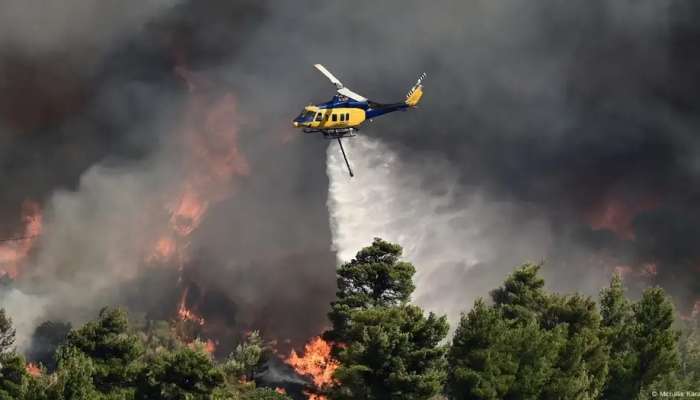
Athens: Smoke from several wildfires covered Greece's capital Athens on Sunday amid extreme weather warnings for the remainder of the week.
Hundreds of fires have broken out this summer across the country, which just recorded its hottest June and July on record.
Prime Minister Kyriakos Mitsotakis cut short his holiday and returned to Athens on Sunday evening to help deal with the situation.
Where are the latest fires?
One of the major blazes raged in the town of Varnavas, some 35 kilometres (22 miles) north of Athens in the region of East Attica.
Fire officials said a force of 250 firefighters, backed by 67 vehicles, 12 firefighting aircraft and seven helicopters were deployed, while residents were instructed to evacuate.
Fire brigade spokesman Vassilis Vathrakogiannis told reporters that some of the flames were more than 25 metres high.
Late on Sunday, the fire service said it had called for the evacuation of several towns including the historic Marathon near Athens.
Marathon, now with a population of around 30,000, is thought to be the site of a famed Athenian military victory over the Persian Empire in 490 BCE.
Another fire erupted earlier on Sunday afternoon in nearby Megara, triggering an evacuation alert.
Forty-eight firefighters equipped with 13 vehicles and additional volunteers were working on the ground, while several planes and helicopters provided aerial support.
In Thessaloniki, a fire in the town of Lagadas was partially under control, with 20 firefighters, 10 vehicles and one helicopter at the scene.
Later Sunday, firefighters said they had dealt with 33 out of the 40 blazes that had broken out over the past 24 hours.
Several other regions of Greece were put on high alert for wildfires on Sunday and Monday.
The country's minister for civil protection Vassilis Kikilias warned on Saturday that the high temperatures, wind gusts and drought conditions meant that half the country was under a high-risk warning.
Kostas Lagouvardos, director of research at the National Observatory of Athens urged a speedy response to any fires as they could quickly burn out of control due to the extreme weather conditions.
"What makes the situation so dangerous is the prolonged drought and very high temperatures that last for a long time," he told state broadcaster ERT.
With winds in some areas expected to reach up to 90 kilometers per hour (56 miles per hour), Lagouvardos said Sunday was likely to be the most difficult day to battle fires.
Greece is exceptionally vulnerable to summer blazes, with this season seeing fires burn daily after the country recorded its earliest heatwave, in June.
Scientists warn that climate change from carbon emissions is worsening the length, frequency and intensity of heat waves across the world.